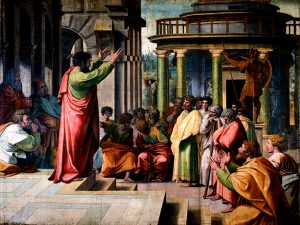Undergraduate Certificate in New Testament Mission
Upon completing the Undergraduate Certificate in New Testament Mission, students will be able to interpret the New Testament missionally and create biblically-based missional practices to join the mission of God in neighborhoods, communities, and societies.
The courses students take as part of this certificate will prepare them to assess ministry approaches in terms of a missional hermeneutic and implement missional approaches that emanate from the biblical text but applied to contemporary multicultural, multiethnic, multireligous settings.
The certificate consists of 18 credit hours. It may be completed in as little as 10 months (during 5 eight week academic terms) or may be spread out over 24 months.
REQUIRED COURSES: 18 HOURS
Did the New Testament give rise to mission or did mission give rise to the New Testament? Many Christians are inclined to think it is the former but the New Testament itself is a product of mission itself. With this in mind, we begin this course by clarifying some key terms (e.g. missional, hermeneutic) before turning to the New Testament documents. Through our study of these and the assessments given the student learns how to approach the New Testament from a missional perspective that appreciates it rootedness and relevance in the first-century cultures, its complex story-like unity with the Old Testament, and its multifaceted witness to the climactic nature of Jesus and his work. Read more
Situates the Gospels within the cultural context of the first-century as we examine Jesus’s mission, including the training methods he used, his collaboration with others, his compassion for individuals and groups, and his mandate for his disciples to take the good news to others, a directive which still has resonance for Christians today at the beginning of the twenty-first century. Students will learn through this course how Jesus went about his mission and how God’s people are to proclaim, enact and embody the gospel. Read more
Focuses on the book of Acts as a witness to the message and methods of the earliest attempts at Christian mission. The goals of the course include discerning what contemporary Christians ought to emulate in modern missional practice. Assessment will include a range of readings, lectures, discussion forums, group projects, and also a descriptive essay. Read more
An examination of Paul’s theology and role as an apostolic missionary through a consideration of his message, the task, the methods and tactics he employed, and his missional goals. Particular attention will be paid to the missional intent of Paul’s theology with an emphasis on its Christ-centered and Spirit-powered nature, as well as a consideration of important practical matters, including how he financed his missional enterprise, his response to suffering, and his urban focus. Read more
Examines the outworking of the mission of God via key themes: the people of God are described as pilgrims and sojourners facing suffering and persecution for the name of Jesus Christ and the shame/dishonour of ancient society associated with such affliction. Nevertheless, they are called to respond appropriately by living holy lives in the midst of false teaching and antagonism to the Gospel, persevering in hope and acknowledging God’s sovereignty over all rulers. Particular attention is given to understanding mission in an eschatological perspective, with the church as a body of pilgrims and resident aliens walking a fine line between submission to the authorities and courageous witness to the Lord. Read more
After the Fall, God immediately sets out on a mission of restoring humankind (relationally) and creation (physically) which will one day end in a renewed heavens and renewed earth. With this holistic mission before us and using restoration (e.g., Jubilee) as an overarching principle, we trace its theological, economic, social, and ethical implications in the Old Testament. The theme of Jubilee and restoration is picked up by Jesus (i.e. Luke 4:1-18) with similar underpinnings and holistic thrust, flowing chiefly from the cross-work and resurrection of Christ and issued forth in godly living. Restoration is further traced via the writings of Paul (Rom. 8:18-25), Peter (2 Pet. 2:1-10) and John (Rev.21:1-3) where God’s plan of the restoration and renewal brings an accompanying responsibility for the people of God to behave morally and responsibly. For the authors of the New Testament, and in light of the end-times, ethics and the eschatology are two sides of the same coin. Read more

